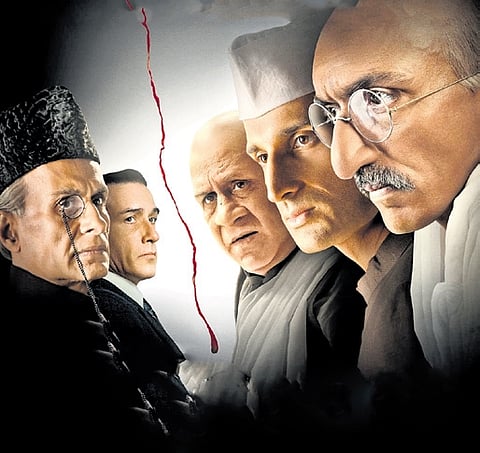

You can hear a clock ticking in almost every scene of Freedom at Midnight. The historical drama chronicles the events that led to India’s independence, dampened by the horrific reality of the Partition. The clock serves as an instrument of urgency. But you never feel a sense of impending doom as a country’s fate is being decided behind closed doors. What could have been a riveting thriller, functions as a drama that is rather mellow.
The details are dense but the storytelling remains straightforward. We are left informed but not necessarily involved. Watching the show was like seeing through a glass wall, as the makers of modern India, and Pakistan, MK Gandhi, Jawaharlal Nehru, Sardar Vallabhbhai Patel, MA Jinnah and Lord Louis Mountbatten debated over the destinies of millions. But you are never there.
Freedom at Midnight is the third period drama series from Nikkhil Advani, after The Empire (2021) and Rocket Boys (2022). It is quite a nerdy adaptation of the 1975 book of the same name by Larry Collins and Dominique Lapierre. The chronology of events in the year before Independence is comprehensively laid out.
After being left bleeding by the Second World War, the British are in haste to leave India. They are trying to mediate between the Congress: godfathered by Gandhi (Chirag Vohra) and fronted by Nehru (Sidhant Gupta) and Sardar Patel (Rajendra Chawla); and Jinnah’s (Arif Zakaria) Muslim League. The bone of contention? A united or divided India. The series delves into a particular time in Indian history when the founding fathers debated which direction an independent nation should take.
There are clashes of multiple ideologies: Jinnah’s secessionism, Nehru’s unification, Patel’s pragmatism and Gandhi’s principles. It makes for interesting drama, in an argument where everyone has fair points to make, but the show is more concerned with mapping out the sequence of events. It gets deep into particular happenings but fails to come together as a whole.
Historicals can be a tough gamble. Often times, either facts or fiction is sacrificed for the other. Freedom at Midnight clings to the details and cursorily explores the drama.
Although the episodes open with scenes of events before 1946, giving context to the characters’ motivations, they still feel half-baked. There is an attempt to humanise Jinnah by showing how he hid his Tuberculosis diagnosis to achieve his dream of Pakistan or his interactions with his sister Fatima (Ira Dubey), but it is quickly snuffed out and we mostly witness the man as being a stern villain, motivated only by jealousy against Gandhi.
Nehru is shown as a quaint gentleman, torn between ideals and practicalities. However, Sidhant Gupta plays him with a certain heavy-handedness, with a strong, husky voice and a reverence that burdens the performance. The same is the case with Chirag Vohra’s Gandhi. He plays the character with such divinity that we don’t get to witness the man’s complexity. Rajendra Chawla, on the other hand, portrays Sardar Patel with impressive ease.
For all its competence, Freedom at Midnight, lacks the spunk that was in Rocket Boys. The show takes itself too seriously. It provides us with a thorough history lesson but remains aloof like a textbook. However, there are moments when the series springs to life, like when after a meeting with British officials, Nehru and Patel get lost in the labyrinth of the Viceroy’s palace or when the Congress and the Muslim League members, like frat boys, try to one-up each other while waiting for an escalator.
I straightened up in my chair when Nehru meets Edwina Mountbatten but their contentious relationship is merely glanced over. The incidents are given precedence over the people but the whys stay hazy.
The series also is a victim of the polarizing times it is set and released. Unlike most period shows, it doesn’t consciously try to speak to the present. But then, in every riot sequence, skull-cap-wearing men are shown parading the streets with swords in their hands or burqa-clad women are seen screaming ‘Lad ke lenge Pakistan (We will fight for Pakistan)’.
I am not contesting the events or calling for a forceful balancing act but there is a subtle one-sidedness. Sikh women are shown jumping into the fire to save themselves from Muslim men, flames dance in front of an idol of Goddess Durga as Hindus are burnt by a Muslim mob. Thankfully, Nehru is not reduced to a smoking and drinking casanova, and Patel exhibits a silent strength more fitting for the Iron Man of India. At a time when historical dramas are more propaganda vehicles, Freedom at Midnight steers clear of sensationalism. It isn’t vile, and sadly, these days that is a lot.
Directed by: Nikkhil Advani
Cast: Sidhant Gupta, Rajendra Chawla, Chirag Vohra, Arif Zakaria and Ira Dubey
Streaming on: Sony LIV
Rating: 2.5/5 stars